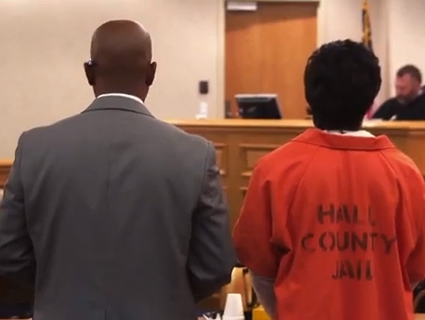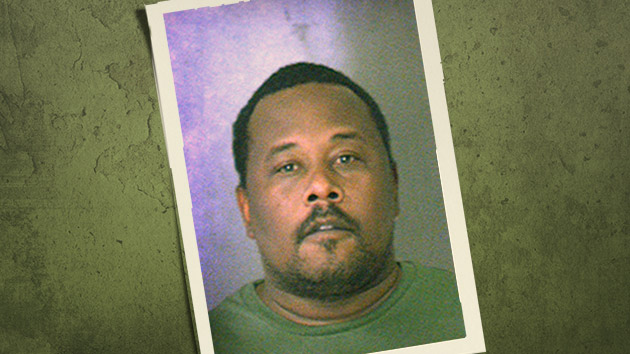
Ben Hill County Sheriff
Eric Wyatt was looking forward to his upcoming release from Georgia’s Douglas County Jail one day in March last year. With past convictions for thefts, traffic offenses, and a probation violation, he had an insider’s knowledge of the criminal-justice system; so when the day came, he was more than a little surprised when the authorities, instead of setting him free, escorted him over to Ben Hill County, where he was served with an old arrest warrant for borrowing a truck and failing to return it on time. Wyatt was very familiar with this theft charge: He had already been arrested, roughly three years earlier, for the crime. In fact, he had already served 179 days in jail in Clayton County as punishment for it. Obviously, somebody had made a mistake.
But no one was treating it like a mistake. When Wyatt appeared before a Ben Hill County magistrate three days later, he was denied bond. According to Wyatt’s sworn affidavit, he was called out of his cell the following day to meet with a lawyer from the public defender’s office and fill out an application saying that he couldn’t afford counsel and was thereby eligible for free criminal representation. Wyatt said that when he tried to talk about the gross mix-up, the public defender stopped him cold: “I am not going to be your attorney,” he said. The whole encounter lasted five minutes.
Wyatt spent 36 more days in jail before a second public defender showed up for another five-minute meeting. Wyatt again quickly explained his situation and provided paperwork as proof. The defender copied the documents and went away. He didn’t discuss the apparent mistake with Wyatt, though. Nor did he mention it to the judge at the bond hearing later that day when Wyatt’s bond was set at $20,000. It may as well have been a million. Wyatt went back to his cell to await trial.
A few weeks ago President Obama gave a rousing speech at the NAACP Conference in Philadelphia. “I want to focus on one aspect of American life that remains particularly skewed by race and by wealth, a source of inequity that has ripple effects on families and on communities, and ultimately on our nation,” he said. “And that is our criminal-justice system.” He spoke about mandatory sentences and solitary confinement, about stop-and-frisk and overcrowded prisons, about the roles of police and prosecutors and judges—indeed, he spoke about every criminal-justice problem but one. He didn’t talk about how poor people who are accused of crimes are defended. He didn’t talk about how the Eric Wyatts of this world are left to fend for themselves in courtrooms across America.
If you drive a few hours south of Atlanta on I-75 and get off at exit 101, you may be distracted by a strange sight—a 98-foot-tall Titan I missile sharing a parking lot with a Gas ‘n Go. A sign declares that the missile, christened on July 17, 1969, rests on “Confederate Air Force Pad No. 1.” This is Cordele, Georgia, the so-called Watermelon Capital of the World and seat of Crisp County, the largest of the four—including Ben Hill County, where Eric Wyatt was rearrested—that make up the Cordele Judicial Circuit.
For nearly a dozen years, the Cordele circuit has been at the center of a storm over the abysmal quality of legal services for criminal defendants who can’t afford to hire a lawyer. A series of legal actions have alleged the “systematic violation of and gross indifference to the right to counsel” and sought to replace its criminal hearings—”now a hollow formality”—with “fair proceedings at which the accused are capably represented.” In other words, these were lawsuits about lawyers.
In 1962, gray-haired and owl-eyed down-on-his-luck drifter Clarence Earl Gideon petitioned the United States Supreme Court, in Gideon v. Wainwright, for the simple dignity of representation in a felony criminal courtroom. The court, voting unanimously, wrote: “[I]n our adversary system of criminal justice, any person haled into court, who is too poor to hire a lawyer, cannot be assured a fair trial unless counsel is provided for him. This seems to us to be an obvious truth.” It became even more obvious when Gideon, represented at his retrial by a competent attorney, was acquitted in little more than an hour. Ten years later, the high court, in Argersinger v. Hamlin, extended this guarantee to misdemeanor charges. In Argersinger, the court’s majority condemned what they called “assembly line justice” for the poor. Legal scholar Edward Barrett described the state of affairs: “For most defendants in the criminal process, there is scant regard for them as individuals. They are numbers on dockets, faceless ones to be processed and sent on their way.” Chief Justice Burger was optimistic that the legal community would make things right: “The holding of the Court today may well add large new burdens on a profession already overtaxed, but the dynamics of the profession have a way of rising to the burdens placed on it.”
The Cordele Judicial Circuit was among the many jurisdictions across the country that did not rise to the occasion. Indeed, the last time national data was compiled, in 2007, indigent defense across the country was in a sorry state. The maximum annual caseload recommended at that time for a full-time defense attorney was 150 noncapital felonies, 400 misdemeanors, 200 juvenile cases, or 25 appeals, according to the National Legal Aid & Defender Association. But the Bureau of Justice Statistics discovered that fewer than one-quarter of county public defender’s offices in the country had enough attorneys to adhere to those guidelines. And 40 percent of the offices didn’t have a single investigator on staff to seek out evidence or interview witnesses. At the 50th anniversary commemoration of the Gideon decision, Eric Holder, then the US attorney general, proclaimed that “America’s indigent defense systems exists in a state of crisis.” The Cordele circuit, and the sad case of Eric Wyatt, offers a window into the problems that plague America’s public defense system.
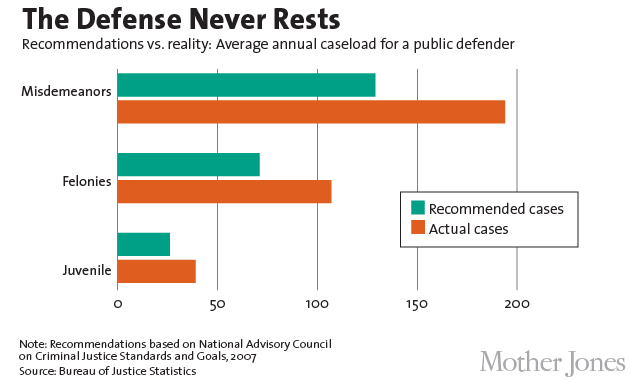
By 2003, when the first lawsuit against the Cordele criminal-justice system was filed—a class action on behalf of all poor people accused of crimes—almost half of the circuit’s indigent defendants were pleading guilty without ever consulting a lawyer, and, according to court documents, the judges were allowing them to negotiate their sentences directly with the prosecutors. At the same time, defendants who asked for court-appointed counsel often regretted it. The circuit had just two part-time attorneys to fulfill its constitutional requirement; for a flat fee each handled all felony and misdemeanor appointments, probation revocation hearings, and appeals for two whole counties. In 2001, for example, each of these part-time lawyers was handling about 330 felonies, which was twice the number of felonies recommended by the Georgia Supreme Court in guidelines intended for full-time lawyers. And both of the Cordele defenders had significant legal practices on the side. One was also a municipal court judge, as likely to see a defendant from the bench as from a defense table.
The lawsuit compellingly documented the excessive caseloads the contract lawyers were responsible for—the attorneys had little time to investigate, talk to witnesses, file motions, research legal issues, or do any meaningful advocacy whatsoever. They rarely met their clients outside of a courtroom. The great majority of their court-appointed clients pleaded guilty. The Southern Center for Human Rights in Atlanta, led by the iconic civil rights lawyer Stephen Bright, referred to the approach as “meet ’em and plead ’em.”
Bright, who has both taught and written extensively and influentially on the right to counsel and race discrimination in the legal system, was the architect of that first lawsuit, and two that followed over the next decade. In 2004, the first was dismissed because the Georgia Legislature, to everyone’s surprise, had passed a law the previous year establishing a statewide public defender system. Michael Mears, then the head of the newly formed Georgia Public Defender Standards Council (which replaced what had been called the Indigent Defense Council), noted that the Cordele circuit public defender’s office would be a new model to be replicated across the state. The Southern Center’s litigation was widely credited for the changes, and an influential legal newspaper named Bright “Agitator of the Year.”
But the celebration was premature. Bright would later look back on the settlement as a mistake: “We thought that the state and the people in the Cordele Circuit were serious about providing competent lawyers,” he noted in an email. “But our expectations were dashed when the new office turned out to be more of a locker room than a law office.”
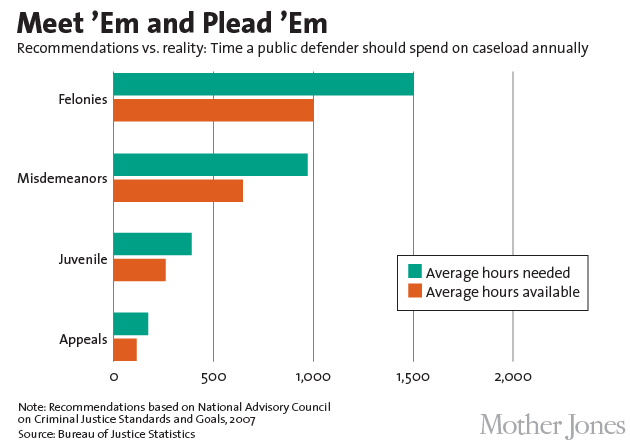
Jail time moves slowly under the best of circumstances. For Wyatt, who was confined to a wheelchair from a bad fall two years earlier, and who suffered from hypoglycemia and high blood pressure, it moved even slower. But nothing made the time drag like the knowledge that he was there unjustly. For two months last year, Wyatt said he neither saw nor heard from any employee of the Cordele public defender’s office. What could possibly be taking so long? The paperwork was clear. Surely any decent lawyer could put one and one together and get him out?
On June 30, 2014, now more than three months after his arrest, Wyatt was back in Ben Hill Superior Court for his arraignment. Instead of having the duplicative charges dismissed, the same public defender he’d provided with the documents brought him an offer from the DA: a sentence of 20 years, 10 of them to be served in prison. “Are you serious?” Wyatt recalled telling the man. “I’ve already served time for this!” Yet again he explained his situation and produced the paperwork. Yet again the public defender assured Wyatt that he would look into it. He would be back on July 2, he said. But that day came and went without a visit.
The new Cordele Judicial Circuit Public Defender’s Office was not, as promised, a jewel in the crown of a reformed indigent-defense system. In 2007, three years after the office was formed, there were five positions for public defenders. By 2009 there were only three working, and each was juggling more cases than any mortal could handle. According to a complaint filed by the Southern Center, Cordele had also failed to set up a dedicated division to defend juveniles that met guidelines required by the 2003 state law (more than 90 percent of juvenile cases involving delinquency and unruliness had been proceeding without defense attorneys). Despite warnings that lawyers in the circuit would be unable to do adequate work, county commissioners slashed funding; the circuit’s four counties were the only ones in Georgia not contributing any money to their defender’s offices. And rather than filling the void, the Standards Council, whose job it was to ensure constitutionally satisfactory representation, stood idly by.
It’s not uncommon for politicians to trim budgets at the expense of the nonvoting bloc of poor people accused of crimes. In the mid-1980s, the Florida Supreme Court ruled that local governments must “firmly and unhesitatingly resolve any conflicts between the treasury and the fundamental constitutional rights in favor of the latter.” A number of other state supreme courts have made similar rulings, but the problem persists.
In 2011, the Rand Corporation published a study comparing Philadelphia homicide cases handled by the well-resourced and well-staffed Defender Association with cases handled by court-appointed lawyers. Not surprisingly, defendants represented by the well-resourced organization fared far better. But the most notable finding was that Philadelphia’s failure to properly fund its public defense system had cost taxpayers more than $200 million over 11 years in extra incarceration expenditures. (Taxpayers in Georgia, of course, were paying for Eric Wyatt to mistakenly sit in jail.) In other words, over the long run there actually isn’t any conflict between the treasury and the constitutional right to counsel. By not directing any funding to the public defender’s office, the counties of the Cordele Judicial Circuit opted to be short-sighted.
The staffing problems of the Cordele defender’s office went beyond not having enough lawyers. Bright wasn’t joking when he called the place a locker room. Emails between the head of the Cordele office and the Standards Council, and other documents submitted to the courts, illuminated ongoing personnel problems that had started shortly after the office opened. According to an affidavit by one male lawyer in the office, the supervisor in those early years, a man named Burt Baker, “tolerated and contributed to an office environment that was extremely hostile to women.” Emails also chronicled behaviors by employees that ordinarily would have called for termination: One lawyer was accused of wearing pajamas at work, keeping his pants unbuttoned in the presence of female employees, using a state computer to look at inappropriate websites, and taking a vacation the week directly before a serious trial (charges the lawyer refutes). The same lawyer was described as a “potential civil liability problem” by Cordele Circuit Public Defender Timothy Eidson, who had taken over the supervisory position after Baker left the office. Eidson moved to get rid of the lawyer, but there was a hiring freeze in place, and state-funded agencies were fearful that if they dismissed anyone, even a lawyer who worked in his pajamas, there would be no replacement. In other words, the Cordele circuit would be down yet another public defender. The Southern Center asked the attorney general’s office to intervene, but it would still be almost two years before Eidson was able to replace the subordinate.
The Cordele circuit had more than just staffing problems, however. For years it had essentially kept its justice system a secret by barring the public from jailhouse courtroom proceedings such as arraignments, bond hearings, pleas, and sentencings. Deputies and bailiffs excluded any civilian, for lack of a better word, who was unrelated to the defendant from the court, and relatives were allowed to attend hearings only if the defendant was pleading guilty. Excluding the public from court proceedings, however, was a violation of the Constitution. As the Supreme Court put it 35 years ago, the “Bill of Rights was enacted against the backdrop of the long history of trials being presumptively open.”
In lawsuit No. 2, filed in June of 2012, Bright and the Southern Center sued the circuit’s judges, and the sheriffs of Ben Hill and Crisp counties, to force them to open up their courts. It wasn’t the first warning these judges and sheriffs had received. One of the accepted conditions of the first lawsuit had been that the courtrooms be “open and unobstructed” to all. A new settlement, in 2013, compelled the Cordele judges to relocate jailhouse hearings to the county courthouses and post signs on courtroom doors welcoming the public to attend. It was the judicial equivalent of being forced to write “I promise to follow the Constitution” 20 times on the school chalkboard.
The Ben Hill County Jail had made national news five years before Eric Wyatt set foot in the place. In 2009, National Public Radio’s Renee Montagne explained:
Inmates in a Georgia jail won’t likely be tickled pink with its new makeover. And that’s just the idea. Officials at the Ben Hill County Jail are painting every wall and bunk Pepto-Bismol pink. Also: the towels, sheets, shoes, handcuffs. Officials say the shocking pink jumpsuits will make escapees easier to catch. But mostly they’re hoping inmates will hate the new decor so much they’ll go straight rather than come back.
The color scheme did little to liven up the place, which, as Wyatt described it, was a “filthy jail riddled with mold and flies where a doctor only comes around once every two weeks and where you have to pay out of pocket to visit nurses and obtain medications.” He’d never experienced such jail conditions, he said. Incarceration is isolating by definition, but if you’re poor and far from your family, a court-appointed lawyer is often your only source of help and support. So when the public defender failed to come back as promised on July 2, there was nothing he could do but wait, and the pink walls provided no comfort.
In January 2014, the Southern Center sued the Cordele circuit for the third time. Despite its expanding criminal caseload, there were only three public defenders (which was half the number of prosecutors) working, and each of them was handling a staggering average of 567 cases a year. The lone investigator in the office spent the vast majority of his time filling out applications from new arrestees, who would go months at a time without seeing a lawyer. The new lawsuit named the state, Gov. Nathan Deal, the commissioners of all four counties, the judges who ran the circuit courts, the members of the circuit’s supervisory panel, the public defender, the DA and all of her assistants, and a man named Travis Sakrison, whom Deal had appointed three years earlier to head up the Georgia Public Defender Standards Council. Sakrison, the son-in-law of Rep. Lynn Westmoreland, had spent the previous decade as a prosecutor, and thus seemed a strange choice to oversee a statewide public defender organization.
In July of last year, as the third lawsuit moved slowly along, Tim Eidson abruptly moved from his position as Cordele public defender to handling death penalty cases at the Capital Defender Office, a job change Sakrison had raised with Eidson two months earlier. To replace him on an interim basis, Sakrison promptly tapped none other than the problematic former Cordele supervisor, Burt Baker, who had been working at the Capital Defender Office. Baker was a startling choice. His behavior as a public defender in Cordele had not been an aberration: At the Capital Defender Office, he had been accused of harassment of several women—inappropriate emails, purchasing of lingerie he would ask women in the office to model, grabbing a coworker’s leg under a restaurant table—resulting in suspensions from his supervisory role. (Neither Baker nor the Georgia Public Defender Council responded to requests for comment.)
According to Stephen Bright, the Southern Center viewed the reappointment of Baker as a sign that it was business as usual in Cordele. Its suspicions were strengthened two weeks later, when a brief job listing for the permanent public defender position appeared on a members-only listserv, with a deadline to apply just six working days from the date of the posting. Bright soon filed an emergency motion in court to halt the “bad-faith, sham” hiring process.
The judge overseeing the lawsuit responded with a temporary restraining order that prohibited Sakrison’s agency from appointing a Cordele public defender. Forced to defend his choice, Sakrison wrote in an affidavit that Baker was a skilled advocate with strong local connections. But he didn’t reference Baker’s troubled employment history, prompting two nonprofit women’s advocacy groups and four female Georgia law professors to write to Sakrison urging him not to give Baker the permanent job.
Sakrison wrote back, claiming that the “untested allegations” of sexual harassment “arose during the public defender process.” Which was nonsense. The complaints had been documented in a 2010 memo by Baker’s supervisor, a copy of which had been placed in his employee file. And the claims were hardly “untested”—not only was the harassment partially in Baker’s own handwriting, but Baker had admitted that some of his behavior had been inappropriate.
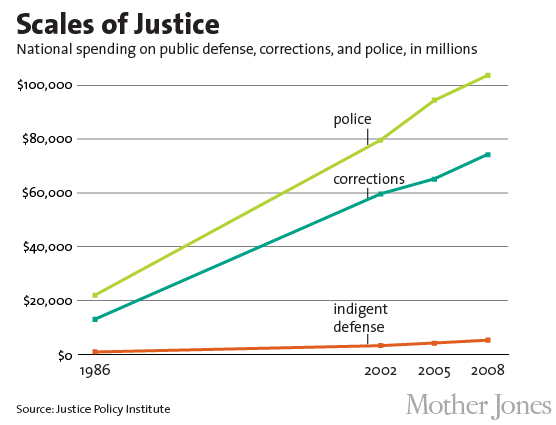
In September 2014, the search committee announced it would extend the application window and circulate the listing more widely. But by then a new candidate had already emerged: Stephen Bright himself.
Bright’s six-page letter, filed during the first, brief application period, is a marvel of understatement, overqualification, and irony. Bright wrote that he “played a small role in bringing about the creation of Georgia’s public defender system,” and that he taught criminal law and procedure at Harvard, Yale, and Emory law schools. He had tried capital cases in three states and successfully argued two cases before the United States Supreme Court. He acknowledged that he was one of the lawyers who had sued the Cordele circuit “seeking to make the constitutional right to counsel a reality,” and concluded by saying that he could “imagine no greater contribution…than taking responsibility for the worst public defender’s office in the state and turning it into a model for Georgia and the nation.”
“Oh, Lord, that’s amazing,” former state Supreme Court Chief Justice Norman Fletcher told the Atlanta Journal-Constitution, when he heard about Bright’s application. “You couldn’t find anyone better qualified.” Baker had his own interpretation. He emailed Sakrison: “I think he is afraid I will solve the problems here without him.”
The next month, a local panel charged with choosing the finalists submitted five names for Sakrison’s consideration. Baker was on the list. Bright was not.
Sakrison didn’t linger. The day after receiving the list, he offered the job to Tracy Mullis, who the Standards Council lauded as a candidate with “extensive criminal defense experience,” including the Georgia Innocence Project and as a public defender in the Middle Circuit. In fact, Mullis’ Georgia Innocence Project work had consisted of one semester during law school, and she hadn’t been employed as a public defender in nearly seven years—she’d been terminated in 2008 for “inappropriate on the job conduct.” Bright was gracious in being passed over, however. “I was looking forward to the challenge,” he told a reporter at the Atlanta Journal-Constitution. “But I know there were a number of others who applied. I certainly hope Tracy Mullis will be able to turn that office around.”
The Southern Center’s lawsuit continued to wend its way through the legal system. Proceedings finally turned to two key claims: the Cordele office’s lack of a juvenile division, and its inability to provide “service of counsel” within three business days of an arrest. One of the first to testify was Public Defender Tracy Mullis. She claimed her office had set up a “dedicated juvenile division.” The problem was, the lawyer she’d tasked with the job had little background in juvenile representation. Nor, for that matter, did Mullis. During one line of questioning, Bright asked her about a recent string of key rulings:
Stephen Bright: What about the Supreme Court that’s written a lot about juveniles and juvenile development here lately? You’re familiar with those cases?
Tracy Mullis: No, I’m not, not that I’m aware of.
Bright: Not Roper v. Simmons?
Mullis: No.
Bright: Miller v. Alabama?
Mullis: Not that I’m aware of by name.
Bright: All right. Graham v. Florida?
Mullis: No.
As for the claim that the office did not provide prompt legal services, the employee who typically made first contact with arrestees was an investigator, not a public defender. When this employee was questioned, he minced no words: “First thing I tell them…is that I can’t give them any legal advice; I’m an investigator.” It was often weeks before a client actually saw an attorney.
At the end of this past February, state House member and former assistant district attorney Chuck Efstration, with the support of the Standards Council, tacked proposals to eliminate both the three-day rule and the requirement for a juvenile division onto an unrelated parole bill. The Standards Council said that the new language was simply to clean up “ambiguous, redundant and unnecessary language” and that the new language “will better reflect how this agency has developed to fulfill its mission: to provide zealous representation consistent with the guarantees of the Georgia and United States constitutions.” Efstration denied that his amendments were a ploy to kill the Cordele lawsuit. “In no way is this legislation being introduced to diminish the right of indigent defendants to have effective, competent attorneys who are in regular and frequent contact with their clients,” he said. After the Southern Center rallied the legal community against the bill, all of the proposals were withdrawn except for one: The word “standards” was formally removed from the Georgia Public Defenders Standards Council title, as the group would no longer promote or enforce performance standards for attorneys.
The federal government stepped into the breach in March, when the Justice Department’s Civil Rights Division and the US Attorney for the Cordele area filed a statement of concern that juveniles weren’t receiving adequate representation, if any. The Civil Rights Division had recently filed similar statements in Washington and New York states to condemn their failing adult defense systems. “For too long, the Supreme Court’s promise of fairness for young people accused of delinquency has gone unfulfilled,” Attorney General Holder proclaimed as he announced the Cordele action. The Georgia attorney general’s office, representing most of the defendants in the lawsuit, offered no response.
One hundred and ten days after Eric Wyatt landed in the Ben Hill County Jail and one week after he rejected the state’s plea deal to serve 10 years in prison, a deputy came to his cell, told him to pack up his things, and handed him a judge’s order dismissing his case. He was finally free to go. On the way out, he noted in an affidavit filed by the Southern Center, he saw his public defender in the lobby and greeted him. The man walked past without a word.
“I know public defender offices get stuck with lots of cases, but this case is one a lawyer’s got to put both feet into,” Wyatt said in the same affidavit. “I thought I was going to prison for a long time and I was terrified because I thought I might not survive it because of my health. I lived with that fear, needlessly, for three and a half months.” His public defender later testified that he hadn’t recalled seeing Wyatt the day of his release. It was two weeks, in fact, before he realized his client’s case had been dismissed.
There are myriad reasons why more than 80 percent of lawsuits are resolved without a trial. Trials are time-consuming, expensive, and unpredictable. No doubt all of those factors were at play when the four Cordele counties and the Georgia state defender settled the Southern Center lawsuit this past spring. The deal did not involve large sums of money or punitive damages. It merely brought the Cordele defender’s office to where it should have been in 2004: adding two full-time public defenders and one full-time investigator to the Cordele staff, setting conditions for job searches, mandating timely visits by an attorney to clients in custody, and requiring the office to maintain a juvenile division led by a lawyer knowledgeable in the representation of children. Finally, in a fit of optimism that comes with resolution after a long-fought battle, there is a clause noting that nothing in the agreement prevents the counties, the state defender, or any other entity from “funding additional positions” in the public defender’s office.
“It’s hard to be anything more than cautiously optimistic,” Bright said afterward. “Processing poor people accused of crime through a justice system that looks like a conveyor belt has been going on for decades, and judges and prosecutors are incredibly resistant to change.
“Let’s just say I hope this is the last lawsuit,” he added. “There are many more Cordeles out there run by people who will disregard the Constitution as long as they can get away with it.”
Though Wyatt and hundreds of others suffered from the circuit’s refusal to meet its constitutional obligations, one party to the lawsuit fared quite well. Gov. Deal appointed Travis Sakrison to serve on the Georgia Superior Court and chose a lawyer named Bryan Tyson to replace him as director of the renamed Georgia Public Defender Council. Tyson earned his law degree from an unaccredited Christian correspondence school in Fresno, California. Like Sakrison, he has close connections to Rep. Lynn Westmoreland, having worked for the congressman as an aide. And like Sakrison, he has never spent a single day as a public defender.
This is how the business of indigent defense gets handled. The usual way.





